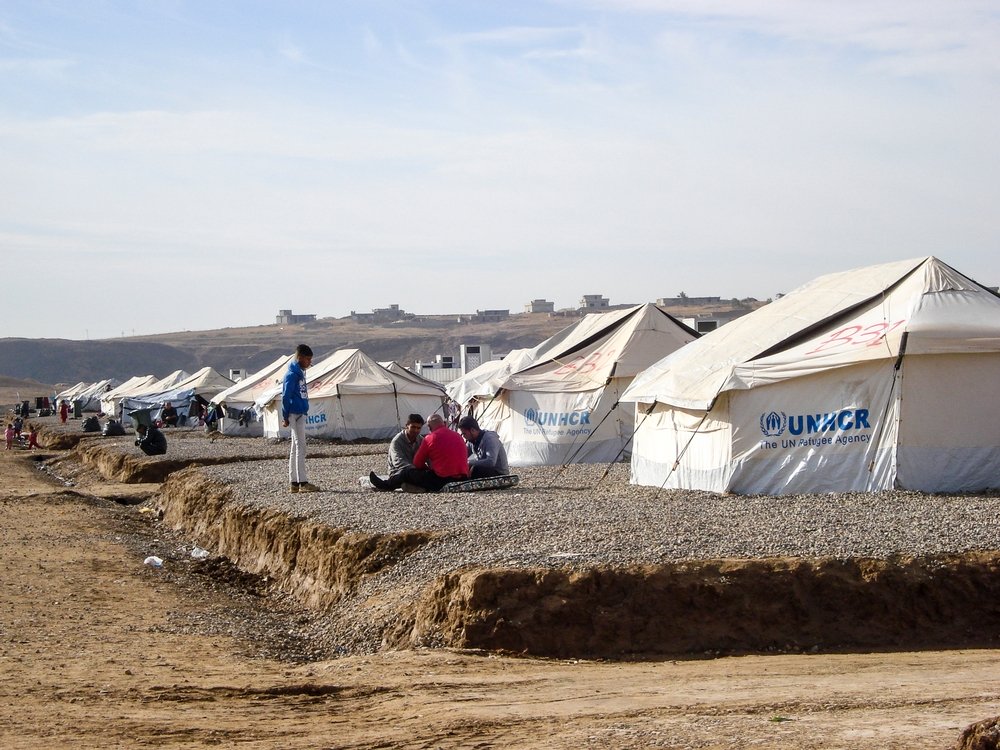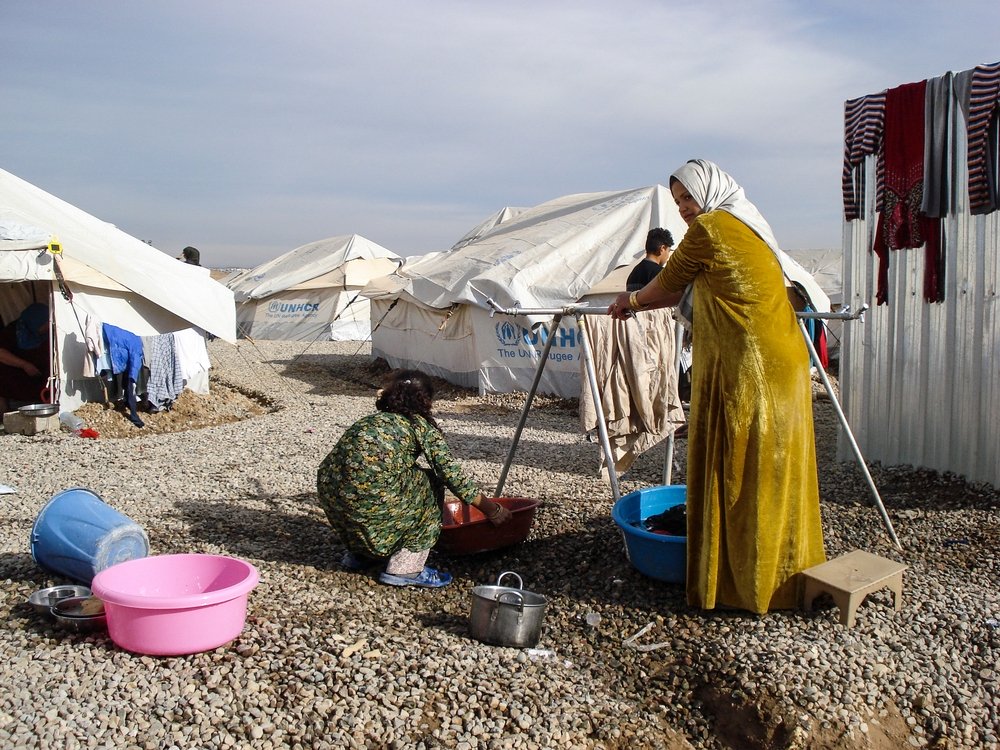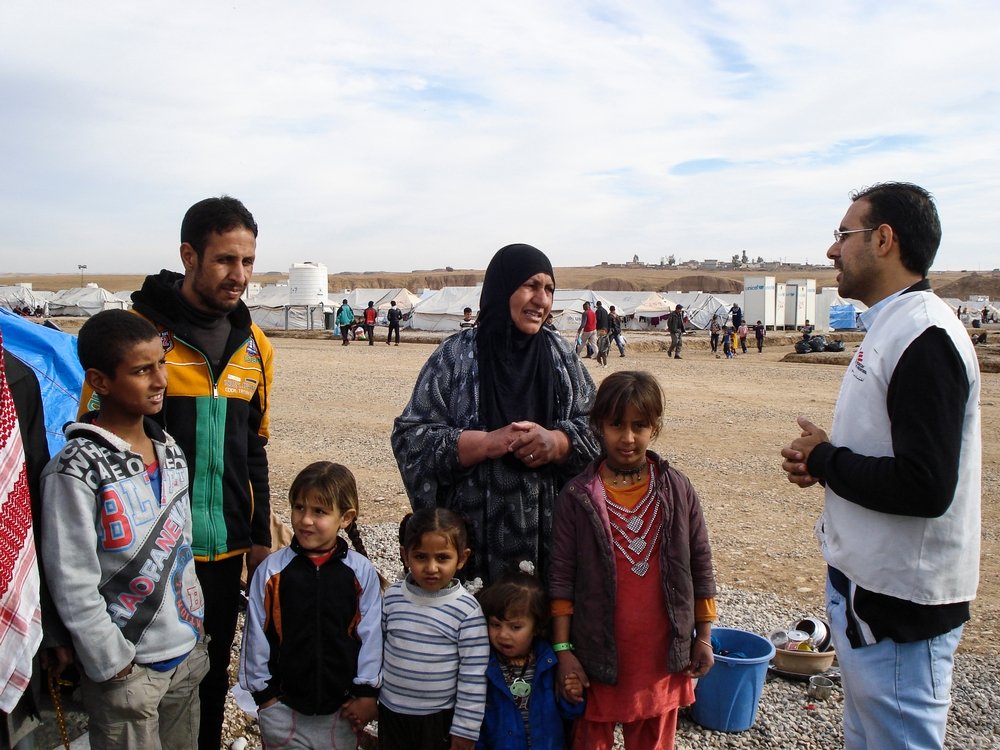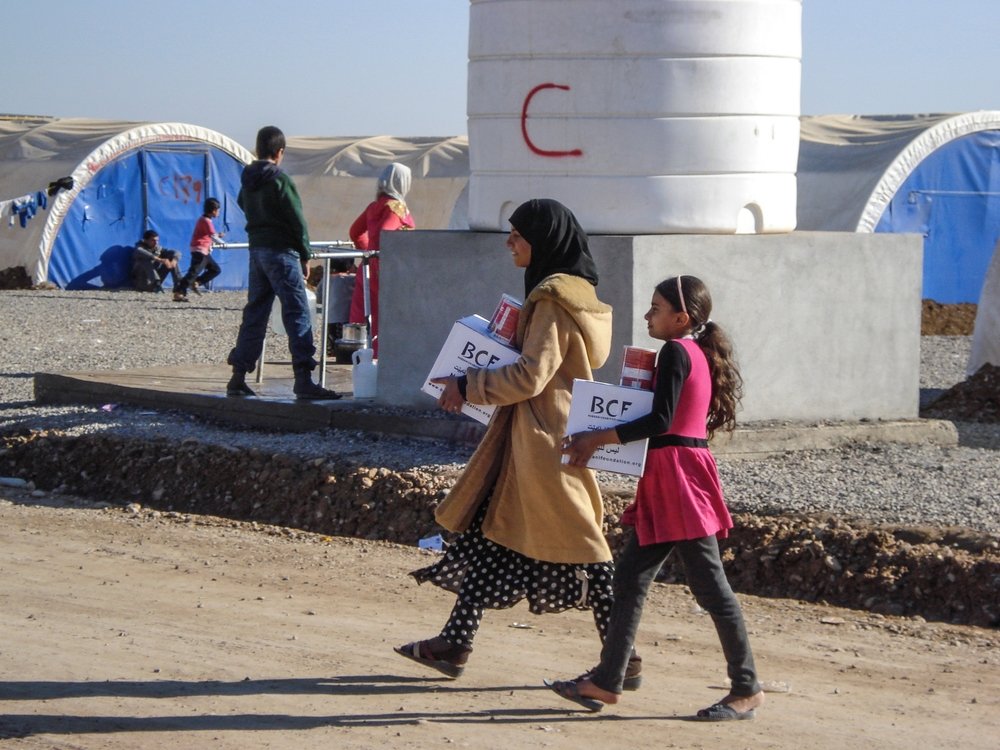In Iraq, the humanitarian situation continues to deteriorate, as people displaced from their homes by violence face their third winter living in harsh conditions.
More than three million Iraqis are currently displaced by the conflict (IOM) and while many have found their way to displacement camps, others are living in schools, mosques, churches and in unfinished buildings.

In addition to the lack of access to healthcare, displaced populations also suffer from the psychological and emotional scars of war and many people still fear for their safety. Meanwhile, more people are being forced to flee their homes as a result of intensified fighting in Mosul and Hawija areas.
Since June 2014, MSF has been increasing its response to the displacement crisis by deploying mobile medical teams, supporting local health structures and opening field hospitals. Having a flexible approach has allowed MSF to deploy mobile medical teams according to people’s needs, with a focus on those who cannot access medical care because their movements are restricted or because they lack the financial means to travel or pay for services.
MSF IN NUMBERS - From January to November 2016
Total number of consultations: 174,931
Number of mental health consultations: 21,686
Number of sexual and reproductive health consultations: 28,782
Number of assisted deliveries: 1,081
Number of national staff: 888
Number of international staff: 116
The Battle of Mosul
As the Battle of Mosul intensifies the number of people forced from their homes is increasing, and as of the first week of December it was estimated that 85,000 people (OCHA) living in the city and the surrounding area had been displaced.
In October, MSF opened a surgical field hospital 30 kilometres north of Mosul, offering life-saving surgery for severely wounded patients not able to reach the closest permanent hospitals. Most of the patients admitted had gunshot or shrapnel injuries. Recently, the MSF team also established a stabilisation point close to the northern frontline for patients in critical condition to they can be moved to hospitals.
In Qayyarah, south of Mosul, MSF opened an emergency room and in-patient department in the compound of a primary healthcare centre in early December. The MSF teams provide surgical and emergency medical care. During the first week, the team received 250 patients.
In order to increase its response in the area, MSF is planning to open more stabilisation posts closer to the front lines. In the past month, the Erbil mobile clinic teams providing general consultations and mental health have expanded their reach to those most recently displaced by the Mosul campaign who are now living in the Khazer and Hasansham displacement camps.

Northern Iraq
In areas close to the front lines in Ninewa governorate, MSF mobile teams are providing general health care, treatment for chronic diseases and mental health services to displaced people, returnees and poor local communities. Other MSF teams are providing similar services in several locations in the Kurdistan region and around Kirkuk.
In Kirkuk itself, MSF is responding to the influx of displaced persons and war-wounded patients from Hawija where a military offensive is underway. Teams are supporting two hospitals and are providing primary health care in displacement camps and along the Kirkuk-Hawija frontline at entry points where people fleeing Hawija cross into Kirkuk.
MSF also recently opened a maternity unit in the village of Tal Maraq, Ninewa, with the aim of assisting safe deliveries. A significant number of women in this area deliver at home without the help of skilled birth attendants. The maternity offers basic emergency obstetric and neonatal care, manages minor obstetric complications, and refers patients with more serious obstetric complications to hospitals in Zakho.
In Sulaymaniyah, MSF is working with the health authorities in Sulaymaniyah emergency hospital and is providing hands-on training to improve the quality of medical services in the intensive care unit and the emergency trauma ward.
Central Iraq
With military operations expanding in northwestern Iraq, thousands of Iraqis continue to flock to relatively safer areas, including the governorate of Salaheddine in the centre of the country. To respond to the growing needs, MSF started running mobile clinics in the city of Tikrit and the surrounding areas in June. The clinics offer outpatient and mental health consultations.

In Diyala governorate, MSF, in collaboration with the Directorate of Health, is providing treatment for chronic diseases, and sexual and reproductive health consultations to displaced people in Khanaqin camps and in the recently retaken towns of Jalawla and Sadyia. MSF teams are also providing mental health services and are running health promotion activities.
In Anbar governorate, MSF runs a 20-bed secondary healthcare centre in a camp for internally displaced people. The camp currently has a population of around 60,000, and the hospital offers them emergency, stabilisation and referral services as part of a short stay programme that will eventually incorporate a mental health component.
Baghdad
The MSF project in Abu Ghraib provides medical and mental health services to people displaced from central Iraq, mainly Anbar, Salaheddine and Diyala. A mobile medical team operates in impoverished neighbourhoods in Abu Ghraib district, where many displaced people have settled in the past two years. A second medical team is based in a primary healthcare clinic in the Al Shuhada II area.
In Bzeibiz, which links the capital to Anbar governorate, MSF has operated a primary healthcare centre since January 2016. The centre has an emergency room open 24/7 and a day clinic.
Southern Iraq

In November, over 20 million pilgrims travelled to Karbala governorate for the Arba’een pilgrimage. MSF took this opportunity to conduct an anti-scabies campaign as people are spending time in close proximity during the event.
Discussions are also ongoing with the health authorities for MSF to support a 70-bed paediatric hospital in Musayib, Babil governorate, starting in January 2017.
Assisting Syrian refugees in Iraq
In Domiz refugee camp, MSF is running a maternity unit where women can deliver their babies safely, as well as access reproductive healthcare. MSF psychologists and psychiatrists are also ensuring mental health services are available to Syrian refugees living in the Kawargosk, Gawilan and Darshakran camps.
Reconstructive surgery in Jordan
Since August 2006, a network of Iraqi doctors has been referring victims of violence from all over Iraq to MSF’s reconstructive surgery hospital in Amman, Jordan. The surgical team specialises in highly complex surgery requiring multiple stages of treatment, in particular, maxillofacial surgery (dealing with the head, neck, face, jaw and sinuses), orthopaedic surgery and surgery for patients with severe burns. Patients also receive physiotherapy and psychosocial support.
Find out more about MSF's work in Iraq.